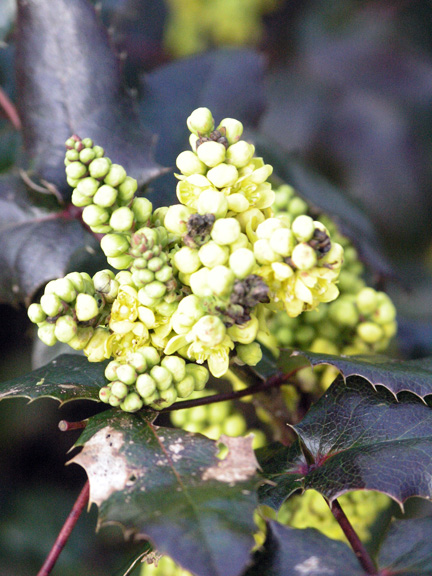| General Description | Evergreen shrub with yellow flowers in the winter and clusters of blueberries in the spring. Short unbranched stems with glossy green leaves. |
| ID Characteristic | Erect raceme of yellow flowers and dark green leaflets. |
| Shape | Upright form, with age the plant will begin to become rounded. |
| Landscape | Specimen plant that has autumn and winter interest. Can be used in mass and group plantings or for screening purposes. |
| Cultivation | Prefers semi-shaded woodland in damp, slightly acidic soil. Can grow in full shade to full sun situations if sufficient soil moisture is present. |
| Pests | Leaf rusts and white flies. Some damage to leaves by a looper caterpillar. Fungal leaf spots and Galls as well. |
| Habitat | Horticultural origin. |
| Bark/Stem Description | Smooth and glossy with a purple tinge on multi-stemed trunks. |
| Flower/Leaf Bud Description | Lateral buds are small and less than 1 cm. Terminal buds larger, 2- 3 cm and are ovoid with 6 bright orange and red scales. |
| Leaf Description | Pinnate structure and approximately 17-21 leaflets. Leaves have spiny teeth on the edges. Individual leaves are 6-11 cm in length and 2.5-4 cm in width. Deep green and glossy on top and yellow-green underneath. |
| Flower Description | Flower is slightly fragrant. Grouped into lemon yellow clusters at the end of the branches. Racemes approximately 20 per cluster. Racemes are 25-35 cm long. |
| Fruit Description | Berries in the spring are blue to black. Approximately 1 cm in diameter. Acidic flavour but edible raw. Berries grow in clusters. |
| Colour Description | Leaves are deep green on top and green-yellow underneath. Flowers are lemon yellow in the winter. Blue berries are produced in the spring. |
| Texture Description | Medium-coarse. |


